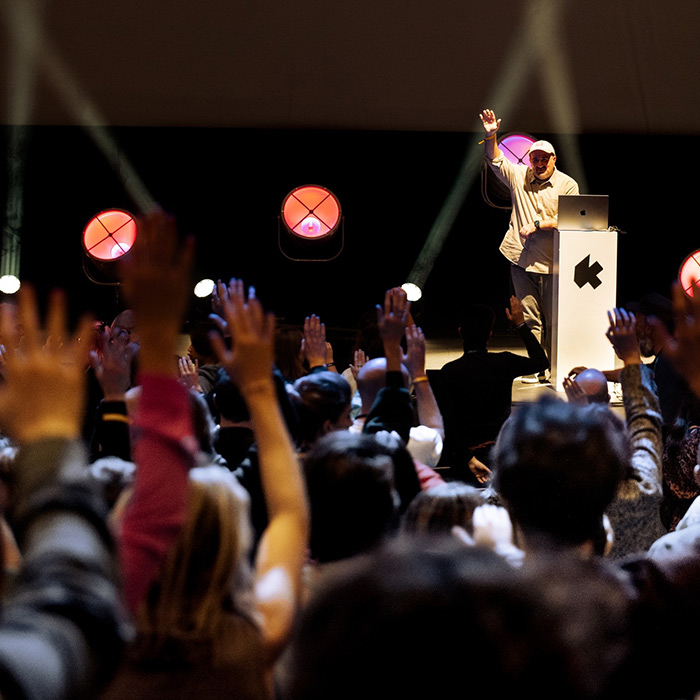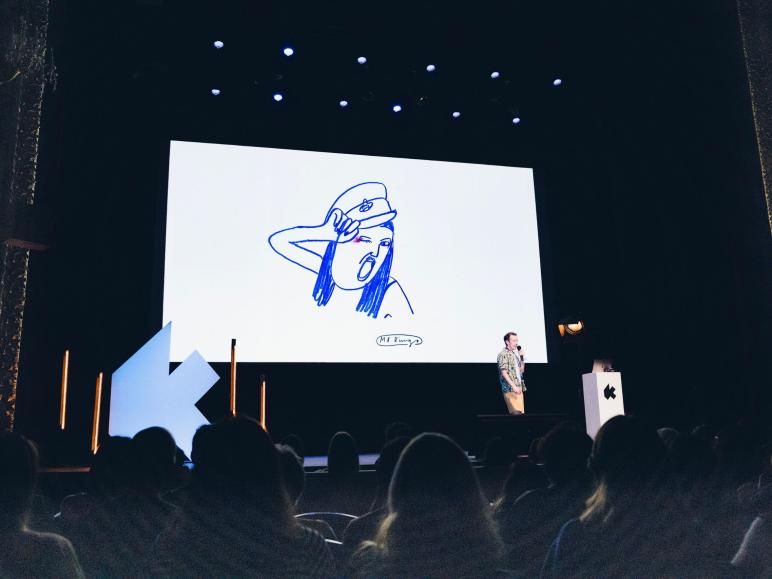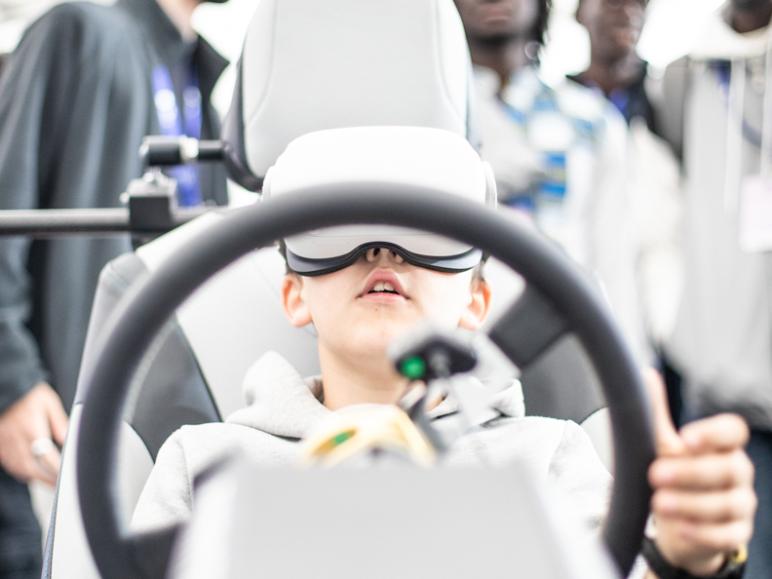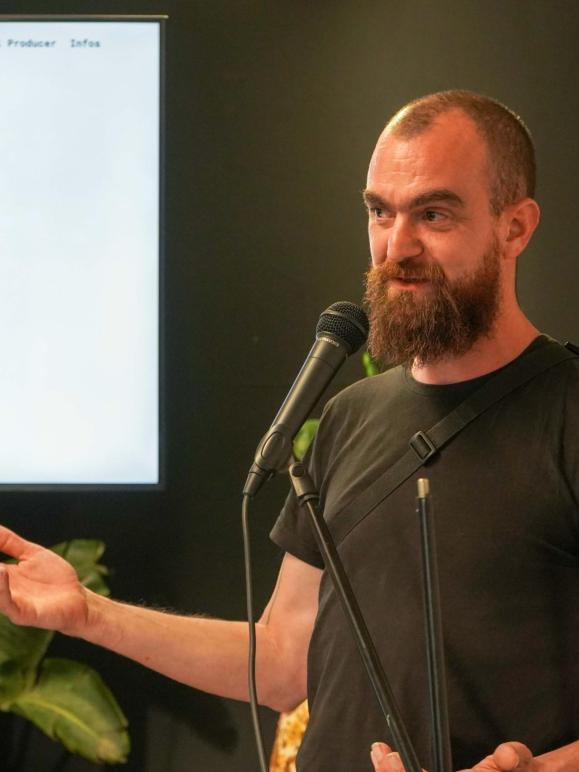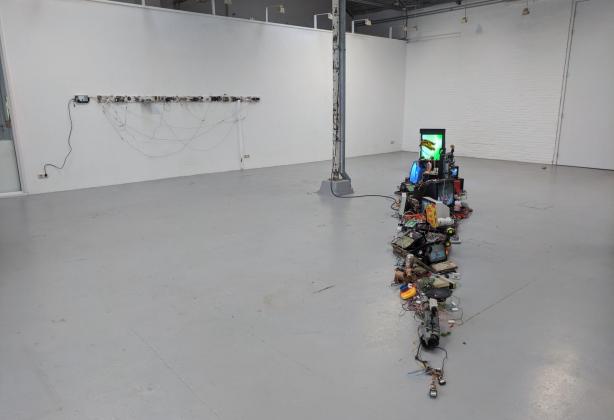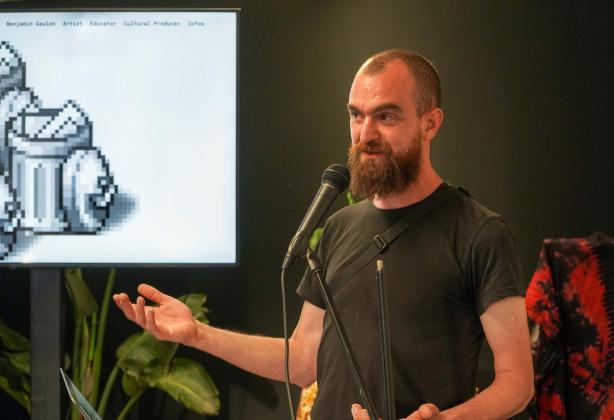Benjamin Gaulon
Benjamin Gaulon is an artist, researcher, educator and cultural producer based in Paris. He has previously released work under the name “recyclism”. His research focuses on the limits and failures of information and communication technologies; planned obsolescence, consumerism and disposable society; ownership and privacy; through the exploration of détournement, hacking and recycling. His projects can be softwares, installations, pieces of hardware, web based projects, interactive works, street art interventions and are, when applicable, open source.
Together with Dasha Ilina, he is a founding member of the collective NØ, a non-profit organisation whose mission is to support and promote emerging art and design research and practices that address the social and environmental impact of information and communication technologies in France and beyond, since its creation in 2018. They are both co-directors of NØ SCHOOL NEVERS since its first edition in 2019.
He is currently professor at SciencesPo, at École normale supérieure Paris-Saclay for the diplôme en Recherche-Création (ARRC), and at CentraleSupélec – Université Paris-Saclay. He was associate professor at Parsons Paris, where he was the program director of the MFA Design + Technology and the BFA Art, Media and Technology, program that he has developed and launched in 2013. Before that he was lecturer at the National College of Art and Design in Dublin, associate researcher at CTVR / the telecommunications research centre at Trinity College and director of DATA (Dublin Art and Technology Association) in Dublin.
Embracing Obsolescence, Glitch, and the Internet of Living Things
I’m Benjamin Gaulon, also known by my research alias Recyclism. I’m an artist, researcher, educator, and cultural producer based in Paris. My work unfolds at the intersection of critical making and artistic inquiry, grappling with the limits and failures of information and communication technologies. I explore themes like planned obsolescence, consumerism, a disposable society, ownership, and privacy via détournement, hacking, recycling, and creative subversion .
In addition to my practice, I serve as a professor at Sciences Po and École normale supérieure Paris-Saclay (in their Recherche-Création program), as well as CentraleSupélec, Université Paris-Saclay . I co-founded NØ, a collective supporting emerging art and design research interrogating the socio-environmental footprint of ICTs since 2018. Since 2019, I’ve co-directed NØ SCHOOL NEVERS, and since 2022 I’ve been the artistic director of Espace USANII in Nevers .
Early Key Projects & Workshop Ethos
Early in my career, I created projects under the Recyclism name that drew from interactive art, glitch aesthetics, physical computing, and e-waste interventions. Notable works include de Pong Game, PrintBall, Corrupt, the Recycling Entertainment System, 2.4 GHz Project, Hard Drivin’, and ReFunct Media.
For example, PrintBall merged graffiti, robotics, and inkjet aesthetic—spraying messages onto walls using a paintball gun. Through 2.4 GHz, I hacked into wireless surveillance and baby monitor signals, placing receivers in public to highlight issues of privacy, surveillance, and our shifting awareness of digital omnipresence. The public’s reactions—curiosity, indifference, surprise—served as a catalyst for dialogue beyond gallery spaces (via We Make Money Not Art).
Since 2005, I’ve led E-Waste and hardware hacking workshops across Europe and the US, inviting participants to re-envision obsolete electronics as creative, generative tools . In 2011, I established the Recyclism Hacklab, a collaborative maker space for physical computing, hardware hacking, open exploration, and mentoring .
Glitch, Corruption, and Critical Making
Central to my practice is the glitch aesthetic—the deliberate or accidental disruption of technological systems. Works like KindleGlitched (damaged e-books) and Corrupt.video explore how failure and corruption can provoke critical reflection on technology’s fragility and impermanence (jeudepaume.org, recyclism.com).
Glitch, for me, is never just an aesthetic gesture—it’s a critical stance towards materiality and digital decay. By materializing error, I aim to challenge assumptions about reliability, permanence, and our tacit faith in ubiquitous systems. Glitch becomes both method and metaphor—a way to reclaim agency in the face of obsolescence.
Toward the Internet of Living Things
My recent explorations extend these themes into rural tech ecologies and what one might call the Internet of Living Things—a poetic yet analytical inquiry into how electricity, data, and living organisms inhabit shared circuits.
I ask: how does technology intersect with non-human agents—plants, ecosystems, rural communities—to evoke new forms of embodiment, affect, and connectivity? What happens when electricity pulses through roots and leaves? When sensor networks capture vegetal states? When “glitch” is not just visual noise but an affective interference between human, plant, and signal?
These inquiries are rooted in media archaeology, tech anthropology, and speculative ecological design—but grounded in the critical-making methodology I’ve cultivated: hacking, repurposing, deconstructing, enlivening. Obsolescent parts become living conduits; rural locales become experimental labs; glitch becomes a bridge between the digital and organic.
Critical Making: Method and Impact
My art-research is anchored in what I call critical making—where hands-on hacking and DIY interventions meet theory, critique, and pedagogy.
I reuse old electronics to create new forms, inviting reflection on planned obsolescence and consumerism.
I deploy glitch and malfunction to surface digital materiality and question our emotional attachments to polished interfaces.
I orchestrate workshops and public actions to transform audiences into co-investigators, building literacies in hacking, data, energy, and ecology.
I envision rural landscapes not as techno-backward, but as critical terrains for rethinking our relationships to energy, network, and environment.
Toward KIKK: Questions and Horizons
At KIKK, I’d like to weave a narrative that connects planned obsolescence, material glitch, and tech-rural affect—asking:
How does the failure of technology expose its politics?
What kind of material agency emerges when electric currents intersect with organic life?
Can we imagine ecological glitches—electrophysiological interference—as flavors of living critique?
How might rural makers reclaim obsolescent devices into tools for place-based innovation, resilience, and intimacy?
Using visual documentation, prototypes, workshop anecdotes, and speculative vignettes, this talk will trace the arc from glitch to glade—from corrupted pixels to lived technicity cohabiting with nature.
Glitch as Biotech Poetics
In sum, my journey as Recyclism has been about embracing failure—not as defeat, but as creative threshold. Planned obsolescence becomes an opening; glitch becomes a lens; rural electricity becomes poetry.
Through critical making, we can repurpose the tech debris of our world—where malfunction doesn’t signal breakdown but invites emergence, entanglement, and new narratives of care.


